Genre et inclusion
Au fur et à mesure que les transferts monétaires continuent à se développer, les parties prenantes demandent une meilleure prise en compte des problématiques de genre et d’inclusion car « des transferts monétaires sensibles au genre qui tiennent compte des disparités et répondent équitablement aux besoins de toutes les personnes affectées par une crise ont le potentiel d’avoir un impact positif sur les femmes et les filles en les protégeant davantage et en favorisant leur autonomisation, tout en renforçant les impacts spécifiques au secteur, qui peuvent rendre les ménages et les communautés ayant vécu une crise plus résilient·es et plus autonomes. » (Directives pour le chantier du Grand Bargain sur les transferts monétaires et le genre). La pandémie de COVID-19 a accru l’urgence de l’assistance car elle a affecté les femmes et les groupes exclus en particulier en augmentant la charge de travail de soin, en réduisant les opportunités d’emploi de manière disproportionnée et en exposant les femmes à des difficultés financières plus fortes et à davantage de violences basées sur le genre.
Le CALP Network continue d’ancrer son travail sur le symposium #GenreEtTransfertsMonétaires organisé en 2018 à Nairobi et sur l’engagement inscrit dans le programme pour l’action collective (Agenda for Collective Action) qui en a résulté. Le rapport « La situation mondiale des transferts monétaires en 2020 » fait état de progrès notables en matière de genre et de transferts monétaires, alors que ce domaine était marqué par des lacunes importantes en matière de données probantes dans le dernier rapport. De nouvelles directives ont été produites sur le genre et les transferts monétaires, ainsi que le genre et les VBG, et des efforts ont été réalisés en termes de synthèse et d’identification de données probantes plus rigoureuses. L’attention, portée initialement aux VBG, s’oriente désormais vers l’égalité entre les genres et l’adaptation de la programmation afin qu’elle ne tienne plus seulement compte du genre mais intègre cette problématique de manière transversale, et même transformatrice. Toutefois, bien que nous remarquions des progrès au niveau technique partout dans le monde, cela ne s’est pas traduit par des changements ancrés en termes de planification, de mise en œuvre et de suivi.
Priorités actuelles
Nous continuerons à travailler étroitement avec les responsables du chantier auxiliaire du Grand Bargain sur les transferts monétaires, CARE et ONU Femmes pour mettre en œuvre le plan de travail. Le CALP Network va continuer à encourager les acteurs de l’assistance monétaire à prendre en compte davantage de problématiques afin d’être plus inclusifs, et de favoriser une meilleure compréhension de la manière dont nous pourrions utiliser les transferts monétaires pour ne pas nous contenter de ne pas nuire mais aussi lutter contre ces inégalités socio-économiques par le biais de la prestation d’autres services et modalités de soutien.
Contenu associé

Collected Papers on Gender and Cash Transfer Programmes in Humanitarian Contexts
Report
Existing gender inequalities mean that disasters and conflicts impact women, men, girls and boys differently. Cash based assistance is one of the most significant developments in humanitarian assistance in recent years. But the relationship between gender and cash based assistance in humanitarian contexts is poorly understood. All too often, interventions are designed based on assumptions...

Guide for Protection in Cash based Interventions
Guidelines and Tools
This guide identifies minimum necessary information and key resources needed to help humanitarian practitioners ensure that protection risks and benefits are considered and monitored throughout the cash-based interventions (CBI) program cycle, using a community-based approach and participatory methods as much as possible. It can help to inform CBI in any program context: protection...

Microlearning video: CVA and Gender
Blog Post
This video provides an overview of the relationship between gender and cash and voucher assistance (CVA) structured around the humanitarian project cycle, which include: Assessment and response analysis: How to adjust the assessment processes to achieve a more accurate reflection of gender and markets. Design and implementation: How to use methods and protocols to reduce the potential...

Better Gender Outcomes in Food Assistance through Complementary and Multi-Modal Programing: Promising Practices Tip Sheet
Guidelines and Tools
This Tip Sheet is excerpted from the research report, “Better Gender Outcomes in Food Assistance through Complementary and Multi-Modal programming,” and gives promising practices by the cycles of project cycle management, as well as at the response level. Additionally, there are expert tips and wisdom practices that support the use of a gendered approach in development or humanitarian...

Cash & Voucher Assistance and Gender-Based Violence Compendium
Guidelines and Tools
The Compendium is intended as a companion to the 2015 Inter-Agency Standing Committee (IASC) Guidelines for Integrating Gender-Based Violence Interventions in Humanitarian Action and its companion resource, the GBV Pocket Guide. The guidance was developed through the efforts of 15 organizations who contributed expertise in the inception, design and review of the document. The process was led...

Cash and Voucher Assistance that Works for Women: 6 lessons from the field
Report
Building on CARE’s commitment to be ‘cash ready’ to achieve breakthroughs with and for women and girl, CARE commissioned a study –in Malawi, Haiti, Jordan, the Philippines and Niger–on gender-sensitive CVA that allowed actual CVA recipients to frame the discussion. This is a brief from the research “What Does Gender-Sensitive Cash and Voucher Assistance Look Like?” and presents...
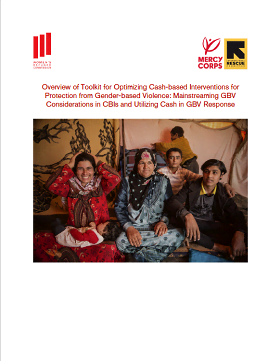
Toolkit for Optimizing Cash-based Interventions for Protection from Gender-based Violence
Guidelines and Tools
Efforts to prevent and respond to GBV should be a priority for all actors in all humanitarian response operations from the very start. By mainstreaming GBV considerations in CBIs throughout the program cycle and by utilizing cash within GBV case management services, cash can be optimized as a tool to enhance the protection of crisis- and conflict-affected populations and to mitigate risks of...
Thematic lead
Contenu récent

Can cash transfers in humanitarian contexts help prevent, mitigate, and respond to gender-based violence? A review of the evidence
Report
Today, approximately 10 percent of humanitarian assistance globally is delivered via cash transfer programming (CTP) and cash is increasingly being scaled across the humanitarian system. Yet the use of cash within the protection sector trails behind the use of cash in all other sectors. Refugee and...

Minimum Expenditure Basket Harmonization Guidance
Guidelines and Tools
The present Minimum Expenditure (MEB) Guidance is an operational tool for the Refugee Response to inform humanitarian multi sector and/or multipurpose cash assistance to meet food needs and a broader set of essential needs of refugees in Uganda.

Bridging the Mobile Gender Gap for Refugees
Report
Mobile phones have become an increasingly powerful tool with which to deliver life-enhancing information, services, and opportunities to millions who have not been able to access them before. This case study analyses data from two refugee contexts in East Africa to understand the degree to which women are...
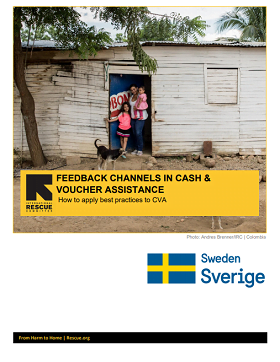
Feedback Channels in Cash and Voucher Assistance: How to Apply Best Practices to CVA
Guidelines and Tools
Accountability is at the core of effective humanitarian programming, and it is our duty to ensure that all programs – including those that use CVA to meet outcomes – are responsive to the clients we serve. While CVA is not inherently more risky than other forms of assistance, there are specific...

CVA for Protection: A Mapping of IRC’s Use of Cash and Voucher Assistance to Help Achieve Protection Outcomes
Guidelines and Tools
The IRC first began to integrate cash into protection programs in 2013, leveraging the flexibility of CVA to support clients living in urban refugee contexts in the Middle East. Since then, IRC has rapidly expanded its use of CVA to help achieve protection outcomes. This scale-up has come with important...
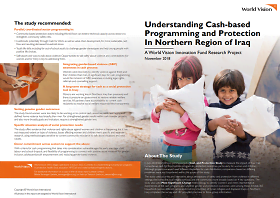
Understanding Cash-Based Programming & Protection in the Northern Region of Iraq-KRI
Report
Cash and Protection Study on impact of CVA (food security focus) on protection outcomes, particularly for women and children.
The study used a survey and interviews about perceptions of safety and protection from violence in different settings: the home, the local neighbourhood, and the community more...

Reflections and recommendations from evaluations of the 2017 CVA Somalia Drought Response
Report
Improving our response to drought to avert crises through the use of cash and voucher assistance requires us to build on experience. This paper pulls together reflections and recommendations from a review of eight evaluation reports, reviews and studies that were conducted during or after the 2017 drought...
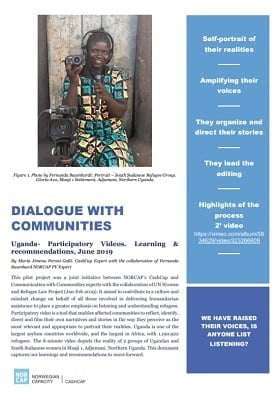
Learning from the Participatory Video in Uganda
Report
Brief lessons learned document of our journey using Participatory Videos (PV) in Uganda. We asked ourselves key questions, and share some tips. What inspired us? Why PV? With PV you take the backseat, are we prepared? What was the role of CashCap & partners? Bottom-up or business as usual? We have raised...
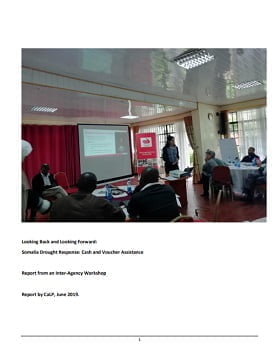
Looking Back and Looking Forward: Somalia Drought Response: Cash and Voucher Assistance
Case Study
This report summarizes the discussions that took place during a one-day learning event on 11th June 2019. The event brought together 27 people from national and international NGOs, the UN, and donors to discuss progress, reflect on cash and voucher (CVA) assistance in Somalia and identify priorities for...
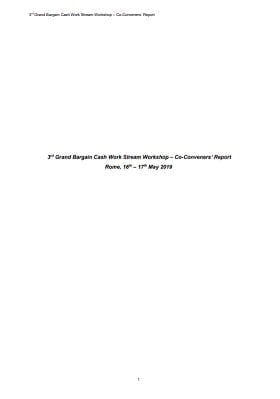
3rd Grand Bargain Cash Work Stream Workshop – Co-Conveners’ Report
Report
The third Grand Bargain (GB) Cash work stream Workshop was held at WFP Headquarters in Rome on 16th-17th May 2019, hosted by WFP and DFID. Over 85 participants attended the workshop, representing 60 donor and humanitarian organisations and multilateral agencies, and including representatives from the...
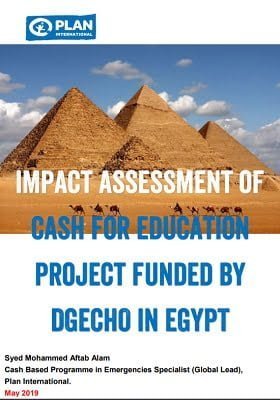
Impact Assessment for Cash for Education Project funded by DGECHO in Egypt
Report
The overall objectives of the Impact assessment were: To measure the impact of cash on the girls and boys by DGECHO funded project. To measure the impact of cash on Education and protection through a gender lens to investigate considerations of power dynamics in the households Understand the good...

Cash for Work (CFW) Guidance Note
Guidelines and Tools
Cash for Work interventions provide employment to unskilled and semi-skilled workers on labour intensive projects such as rehabilitation of irrigation systems, soil conservation, and road construction and maintenance.
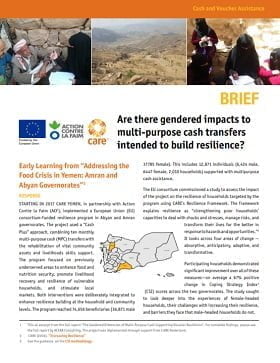
Are there gendered impacts to multi-purpose cash transfers intended to build resilience?
Report
Brief from full report “The Gendered Dimension of Multi-Purpose Cash Supporting Disaster Resilience” extracting the specific gendered findings from a study on the impact of an EU funded project that used a “Cash Plus” approach, combining ten monthly multi-purpose cash (MPC) transfers with the...

The Gendered Dimension of Multi-Purpose Cash Supporting Disaster Resilience
Report
In 2017, in response to the mounting humanitarian crisis in Yemen, CARE Yemen and Action Contra la Faim (ACF) implemented a cash transfer program and community asset rehabilitation and skill building programing in the governorates of Abyan and Amran. This European Union (EU)-funded program integrated...
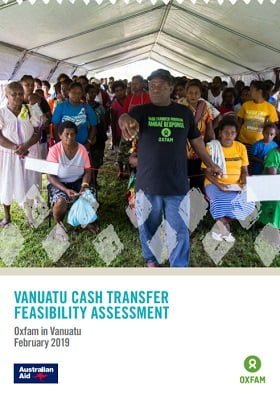
Vanuatu Cash Transfer Feasibility Assessment
Report
Oxfam conducted this Vanuatu Cash Transfer Feasibility Assessment in partnership with Youth Challenge Vanuatu, Department of Agriculture & Rural Development, and the Vanuatu National Statistics Office with funding from the Australian Department of Foreign Affairs and Trade (DFAT) through the Australian...

Vanuatu Cash Transfer Feasibility Assessment – Report summary
Report
This is a summary of the findings of the Vanuatu Cash Transfer Program (CTP) Feasibility Assessment that was conducted to build a context-specific evidence base to guide preparedness initiatives related to the use of cash and vouchers as a means of humanitarian assistance for response, recovery and...

The CALP Network Publishes Collection of Research Papers to Fill the Evidence Gap Around Gender and Cash
Blog Post
UN Women, Concern Worldwide and World Food Programme are the first to contribute research to this ongoing series of papers.

Study on Identifying Cash for Work Opportunities for Women in Za’atari Refugee Camp
Case Study
The purpose of the study is to identify opportunities for women to engage in Oxfam’s CFW across Za’atari Camp. The specific objectives of the research were to: Review existing Oxfam CFW posts that can be targeted for women; Identify key barriers (physical and non-physical) to women’s participation...

The CALP Network’s Karen Peachey in Devex: “For cash transfers to work, we can’t ignore gender”
Blog Post
Our interim director Karen Peachey is featured on Devex.com discussing the need to build the evidence around the relationship between gender and cash transfers. The CALP Network’s ‘Collected Papers on Gender and Cash Transfers’ is out now.
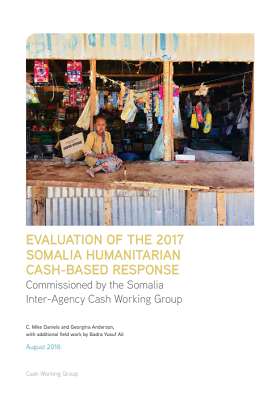
Evaluation of the 2017 Somalia Humanitarian Cash-Based Response
Report
After several years of poor rainfall, the humanitarian community responded to a famine alert issued in January 2017 with a significant scale-up of funding and programmes. Having originally published a 2017 Humanitarian Response Plan (HRP) in November 2016, by May 2017, the Somalia Humanitarian Country...

